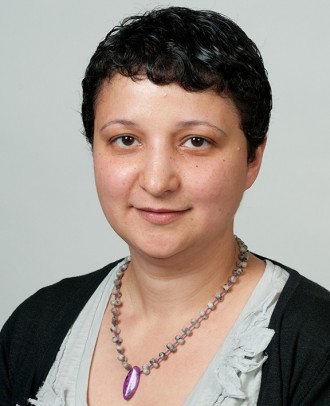Seeking new treatments for an incurable cancer
The mortality rate for ovarian cancer has not improved in more than 40 years. Maria Barbolina is working to change that.
“Metastatic ovarian cancer is currently incurable,” says Barbolina, assistant professor of pharmacology at the University of Illinois at Chicago.
“One way to change this situation is to develop new approaches and drugs that either alone or in combination with already existing ones are capable of fighting the disease.”
Barbolina is one of six U.S. scientists to receive a grant from the Ovarian Cancer Research Fund through its Liz Tilberis Scholars Program, named for the former British fashion magazine editor who died of ovarian cancer in 1999.
Barbolina will receive $150,000 annually for three years to fund her continuing research.
Through her research, Barbolina has discovered that fractalkine receptor — a protein found on the cell surface — is expressed in the majority of ovarian cancer cases. The fractalkine receptor could help the cancer spread to other organs throughout the body if it is stimulated by another protein that binds to it.
If the expression of the fractalkine receptor is decreased, it leads to significant slowing of metastatic growth in an animal model, Barbolina said. Therefore, fractalkine could be a potential drug target against ovarian cancer.
About 22,240 new cases of ovarian cancer will be diagnosed in the U.S. this year, and 15,500 women will die of the disease, according to the American Cancer Society. A woman’s lifetime risk of developing ovarian cancer is 1 in 17. Most cases develop after menopause.
Symptoms of ovarian cancer include bloating, pelvic or abdominal pain, feeling of fullness, or urinary tract complaints.
Few treatments were available in the 1970s. Diagnosis often did not occur until the disease was in its advanced stages, and women typically did not survive longer than six months. Today, almost half of patients are alive five years after diagnosis.
Barbolina is the second UIC researcher to be awarded a Liz Tilberis grant since its inception in 2000. Joanna Burdette, assistant professor of pharmacognosy, was a recipient in 2011.
UIC ranks among the nation’s leading research universities and is Chicago’s largest university with 27,500 students, 12,000 faculty and staff, 15 colleges and the state’s major public medical center. A hallmark of the campus is the Great Cities Commitment, through which UIC faculty, students and staff engage with community, corporate, foundation and government partners in hundreds of programs to improve the quality of life in metropolitan areas around the world. For more information about UIC, please visit www.uic.edu.

